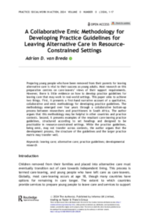Preparing young people who have been removed from their parents for leaving alternative care is vital to their success as young adults. Most research on this preparation centres on careleavers’ views of their support requirements. However, there is little evidence on how to develop practice guidelines for leaving care that may work in real-world settings.
This paper aims to achieve two things. First, it presents a first-hand narrative account of a qualitative, collaborative and emic methodology for developing practice guidelines. The methodology emerged over four years through a collaborative bottom-up process between researchers and practitioners in South Africa. The author argues that this methodology may be helpful in other countries and practice contexts. Second, it presents examples of the resultant careleaving practice guidelines, structured according to set headings and designed to be practicable in resource-constrained settings.
While the practice guidelines, being emic, may not transfer across contexts, the author argues that the development process, the structure of the guidelines and the larger practice matrix may transfer well.

